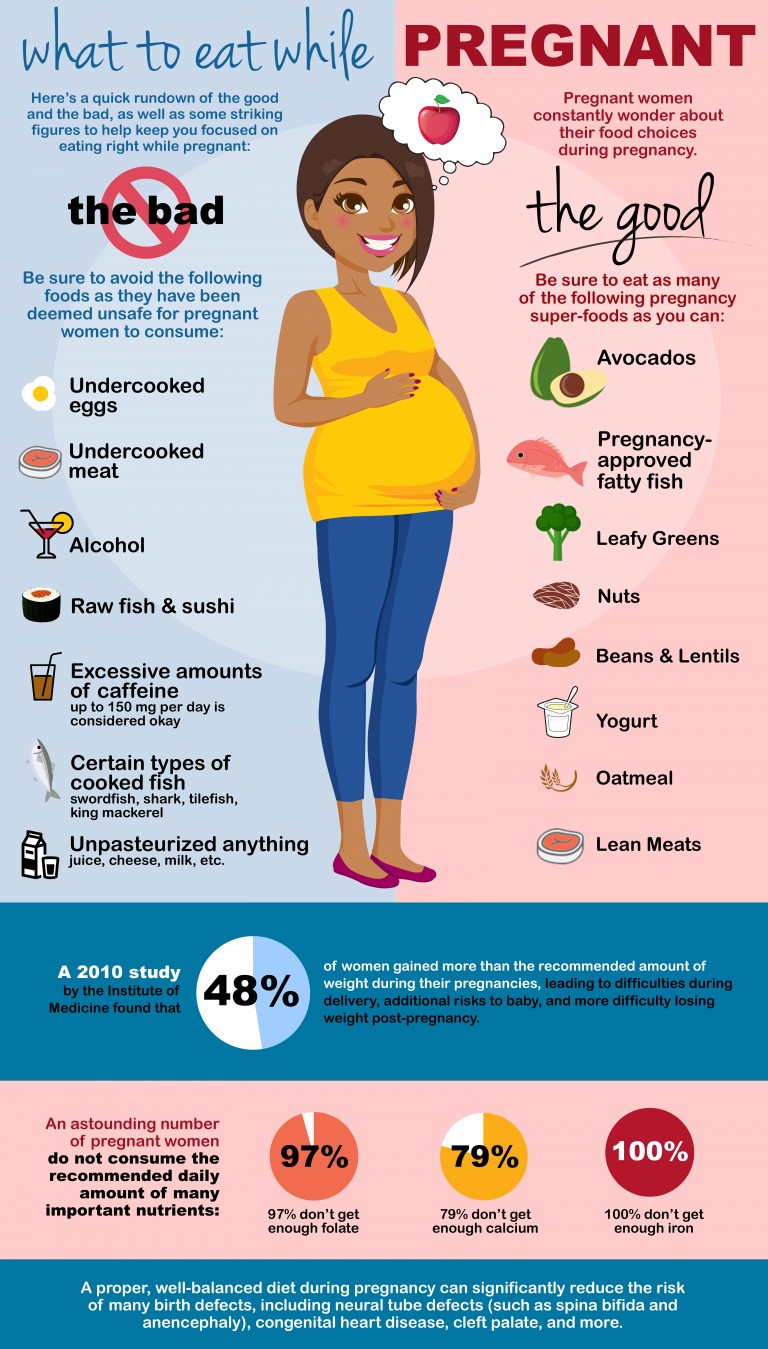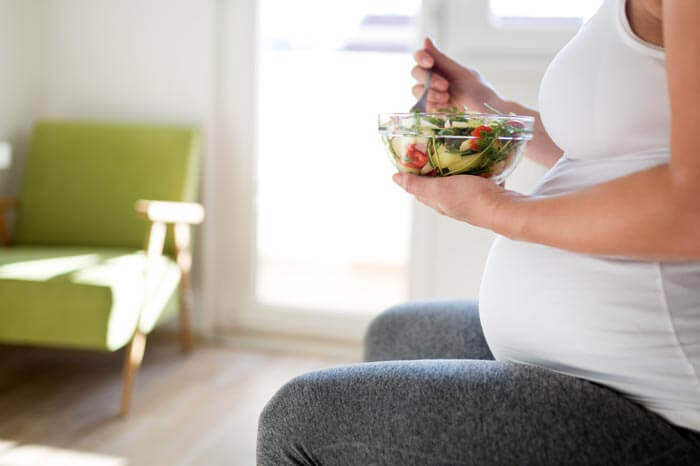Pregnancy is a beautiful, yet challenging, time in many women’s lives. Along with the joys and discomforts that pregnancy brings is the challenge to eat well. Pregnancy is probably the most important time of your life to ensure you’re eating a well-balanced diet, and your diet during pregnancy is one of the biggest influences on your child’s overall health and wellness. Whether this is your first pregnancy or your fifth, this guide to pregnancy nutrition will help you make wise food choices throughout your entire pregnancy. No matter if you’re trying to get pregnant, newly pregnant, or about to pop, it’s never too late to improve your diet during pregnancy and make the most of pregnancy nutrition! Read on for the good and the bad, the dos and don’ts, some striking stats, and some general pregnancy nutrition tips.
The Importance of a Balanced and Nutritious Pregnancy Diet
Babies get the fuel to grow and develop from your nutrition. Protein is a key component of their fetal body systems, so getting a substantial amount of protein each day is a big part of proper pregnancy nutrition. Carbohydrates are an energy source for both you and baby, so making sure you’re eating enough healthy carbohydrates, like whole grains and fruit, is vital. Healthy fats play a big role in the development of baby’s nervous system, as well as for vitamin absorption. While you shouldn’t ever overdo it on fats, it’s important to consume the recommended amount of healthy fats throughout your pregnancy.
Everyone knows that weight gain is a part of pregnancy, and since you don’t want to gain too much or too little, having a well-balanced pregnancy diet is incredibly important. One of the greatest misconceptions about pregnancy nutrition is that a mother is “eating for two.” While an increase in calories should occur at a certain point, it is nowhere near double the normal amount. Most women need about 300 extra calories per day in their second and third trimesters, but those should be nutritious calories rather than empty ones.
Dos of Pregnancy Nutrition – Foods to Eat
During your pregnancy, you’ll likely get a ton of information and advice from various people about your diet during pregnancy. It’s important to take their advice with a grain of salt and consult the experts and your doctor or midwife to ensure you are consuming the best diet for you and your baby. Here are some big “dos” for your diet during pregnancy.
DO eat a balanced diet – aim for 2-4 servings of fruit, 4 servings of vegetables, 6-11 ounces of grains (at least half should be whole grains), 3 servings of protein (lean and cooked well-done), and 4 servings of dairy each day.
- Lean Meats: Important for iron and protein; especially beef, pork, chicken, and turkey
- Yogurt: Important for calcium, probiotics, and many vitamins and minerals; Greek yogurt low in sugar is the best option
- Whole Grains: Important for fiber and vitamins; oatmeal, quinoa, cereals, bread, pasta, rice
- Avocados: Important for healthy fats and multiple vitamins and minerals; also can help with leg cramps due to high potassium levels
- Leafy Greens: Spinach, kale, turnip greens, broccoli, Brussels sprouts, asparagus
- Sweet Potatoes: Important for baby’s immune system, skin, and eyes; also helps with nausea
- Nuts: Almonds, peanuts, macadamia nuts, pistachios, walnuts
- Legumes: Important for folate and fiber; lentils, beans of all kinds, chickpeas, soybeans, black beans
DO eat seafood, but in moderation. Fish is packed full of protein, iron, and omega-3 fatty acids, all of which are vital to a healthy pregnancy. While you should avoid fish high in mercury and eat no more than 12 ounces of fish a week, eating well-cooked, pregnancy-safe fish is a definite DO!
- Pregnancy-approved fatty fish: Alaskan salmon, Atlantic mackerel, herring, sardines, and anchovies
DO consume as many vitamins and minerals in your food as possible, in addition to taking a prenatal multivitamin. Folic acid, calcium, and iron are generally considered the most important for pregnant women.
DO try to eat more “whole” foods and avoid eating too many processed foods. If this is a challenge, aim for at least one form of produce at every meal, even if it’s cooked or was previously frozen.
DO vary the color of your foods by eating a “rainbow,” as they say. Different colors foods have different vitamins and minerals in them, so if you’re not into researching the nutritional makeup of everything you eat, just aim to have a colorful plate at every meal.
Don’ts of Pregnancy Nutrition – Foods to Avoid
Fear can be a huge issue during pregnancy, so rather than nitpicking and panicking about every little thing, we simply recommend staying as healthy as possible and making the best decisions you can for you and your baby. That being said, there are a handful of things you should stay away from during pregnancy, as numerous studies have shown that they can be dangerous for you and your baby.
DON’T drink a lot of caffeine Depending on who you talk to, you’ll get a different amount of how much caffeine is okay and how much isn’t.
Avoiding caffeine as much as possible is in your best interest, as caffeine has been linked to increased risk of miscarriage, higher blood pressure, and a higher heart rate. If you HAVE to have caffeine, try to keep it under 200 mg a day, and remember that it can be found in more than just coffee. Teas, chocolate, medicine, and ice cream can all have varying amounts of caffeine. Green teas, often perceived as a healthier choice, also contain caffeine, typically ranging from 15 to 50 mg per cup.
DON’T eat deli meat, unless it is thoroughly heated before consuming. This includes smoked salmon, hot dogs, sausage, and any other cured meats. If you’re really craving a sub or sandwich of some kind, be sure to microwave or otherwise cook the meat to steaming before you eat it to ensure you minimize the likelihood of contracting listeriosis, which is a bacterial illness that can cause complications during pregnancy.
DON’T eat unpasteurized cheeses, milk products, or juices. Pasteurization is a process that heats milk products and kills any potentially harmful bacteria. Avoid soft cheeses (Brie, blue cheese, feta, most cheese dip) and raw or otherwise unpasteurized milk. Unpasteurized juices can also contain bacteria from the fruits or vegetables it is made from, such as E. coli or salmonella, which can make you incredibly sick and can potentially be passed on to your unborn baby.
DON’T eat raw or undercooked meat. This includes sushi, hamburgers, steak, and any other type of meat. Undercooked and raw meat can be contaminated with listeria and other bacteria that can lead to extreme sickness and complications during pregnancy.
DON’T drink alcohol. While some health care providers may tell you that small amounts are okay, the risks associated with alcohol consumption during pregnancy are simply not worth it. Opt for mocktails, non-alcoholic spritzers, or other beverages that are safe to consume while pregnant.
DON’T eat undercooked, raw, or runny eggs. This is the same concept as eating raw or undercooked meat—you increase your risk of bacteria-induced sickness when consuming undercooked eggs. This includes, unfortunately, not licking the spoon when making cakes, brownies, and cookies.
In general, aiming for a healthy, balanced pregnancy diet is not as hard as it may seem. Eat a variety of foods, don’t overdo it, and avoid the big no-nos. If you do that, healthy pregnancy nutrition will be easy to come by! If you’re looking for more specifics about what you should and shouldn’t eat, or even just a more basic, straightforward list, we’ve got you covered. Check out the good and the bad below, followed by some surprising statistics and some more in-depth information about pregnancy nutrition.

What to Eat While Pregnant
Share this Image On Your Site
The Stats About Nutrition During Pregnancy:
Your nutritional needs don’t change drastically when you become pregnant, but some vitamins and nutrients are incredibly important during pregnancy. You need more folic acid, iron, and calcium during pregnancy than you did before. While some women are more predisposed to nausea, constipation, and heartburn during pregnancy for a variety of reasons, studies have shown that consuming a healthy, balanced diet, drinking enough water, and remaining active during pregnancy can help lessen some of these unpleasant symptoms.
Healthy Weight
A 2010 study by the Institute of Medicine found that 48% of women gained more than the recommended amount of weight during their pregnancies, leading to difficulties during delivery, additional risks to baby, and more difficulty losing weight post-pregnancy.
In the United States, the prevalence of excessive gestational weight gain ranged from 38% to 54% across different states (CDC), leading to difficulties during delivery, additional risks to the baby, and more difficulty losing weight post-pregnancy.
Gaining too much weight during pregnancy is not only a problem of weight retention for mom after the baby is born. It can also lead to risks during pregnancy, such as preterm labor, preeclampsia, gestational diabetes, gestational hypertension, possible birth defects, and shoulder dystocia in babies.
Daily Diet
More than a third of pregnant women reported in the NHANES study consumed diets that were below the estimated average requirement for critical nutrients like vitamins D and E, iron, and magnesium. An astounding number of pregnant women do not consume the recommended daily amount of many important nutrients: 97% don’t get enough folate, 79% don’t get enough calcium, and 100% don’t get enough iron.
Birth Defects
A proper, well-balanced diet during pregnancy can significantly reduce the risk of many birth defects, including neural tube defects (such as spina bifida and anencephaly), congenital heart disease, cleft palate, and more.
Why Avoid These Foods While Pregnant?Why avoid these foods while pregnant?
You’ve got the basics down now. You know the foods to avoid while pregnant and you know the best foods to eat while pregnant. But you may be wondering what the big fuss is about the foods you should and shouldn’t eat while your baby is growing inside you. Yes, you want your baby to be as healthy and safe as possible, but why is sushi unsafe? Why shouldn’t you eat undercooked eggs? And why the limit on caffeine? Read on to learn the “whys” of all the foods to eat and avoid while pregnant.
Risks of Infection
Undercooked meat (including fish) and highly processed meat (like lunch meat) bring risks of infection due to bacteria or parasites. Cooking kills any potential hazards in the meat, so everything you eat should be well done. If you contract a parasite or bacteria, you could just get a little sick, or you could have much more severe consequences. Your baby could experience severe neurological issues, blindness, epilepsy, mental retardation, or stillbirth. This is definitely a strong contender for the most important “what not to eat while pregnant” food.
Raw or undercooked eggs bring the risk of salmonella. Usually, salmonella results in the mother being very sick with fever, nausea, cramping, diarrhea, and vomiting. In extreme cases, stomach cramps can affect the uterus and lead to premature birth or stillbirth.
Restricted Fetal Growth
Caffeine, while okay in moderation, should be avoided in excess during pregnancy. You’ve probably heard this, but you may not know why. Unborn babies aren’t able to metabolize, or break down, the caffeine effectively, which can result in a buildup of caffeine in their tiny bodies. This can bring about restricted fetal growth and low birth weight, which can later lead to an increased risk of infant death and an increased risk of chronic disease during adulthood.
Unpasteurized milk, juice, and cheese all bring about a risk of contracting bacteria, such as listeria, salmonella, E. coli, and the like. These infections, in addition to making mom sick, can bring about life-threatening problems for the unborn baby. Make other choices and check out our list of what to eat when pregnant to get more nutrients and vitamins while avoiding dangerous foods during pregnancy.
Alcohol is a big no-no during pregnancy, even though some people are convinced it’s safe in moderation. Not only does it increase the risk of stillbirth or miscarriage, but it can hugely impact your baby’s brain development, and it can cause heart defects and mental retardation. It’s not worth the risk to your child to enjoy a few glasses of wine, so just avoid alcohol altogether during your pregnancy.
Toxics
You may wonder why there are “pregnancy-approved” fish and other fish that are off-limits. The fish you should avoid during pregnancy are high in mercury, like swordfish, king mackerel, and tuna. Mercury is often found in water where these fish live, and it can be incredibly toxic to you and your unborn baby. It can negatively affect your nervous system, your immune system, and your kidneys, and it can bring about serious developmental issues in babies and children.
Pregnancy Care at TrueCare
Our commitment to women’s health shines brightest through our comprehensive pregnancy care services. Staffed by compassionate professionals who specialize in obstetrics and prenatal care, we ensure every expectant mother receives the highest quality of personalized care. At TrueCare, our Women’s Health Services include regular health checks, nutritional guidance, childbirth education classes, and access to specialists if needed. Schedule your appointment today!





